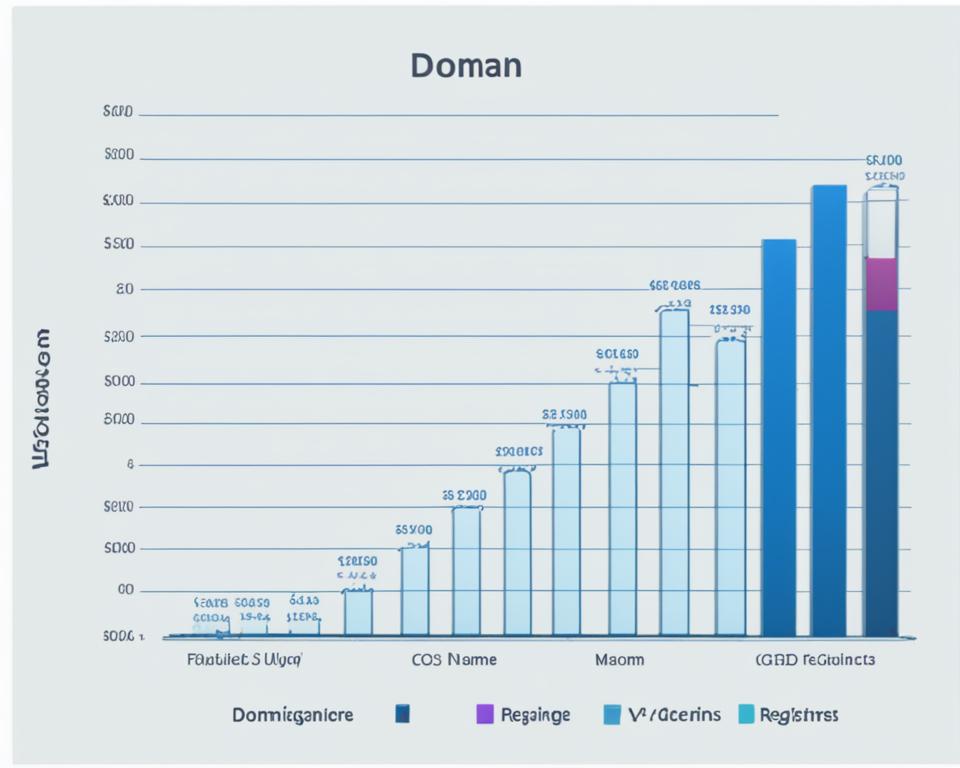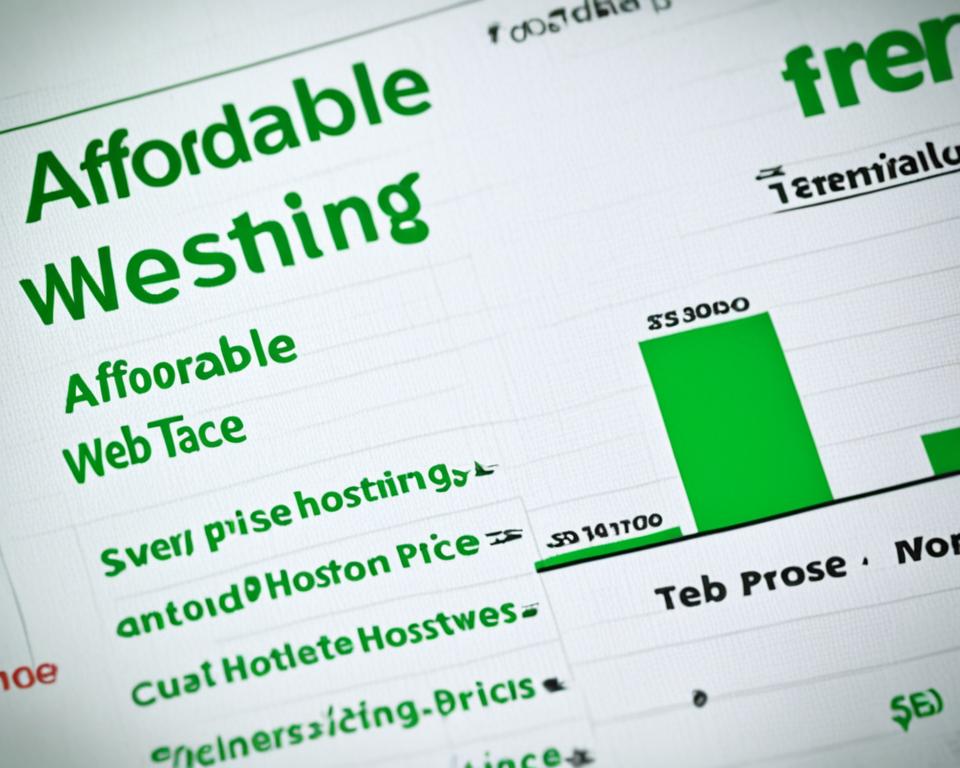Web hosting is an essential service for launching a website, but figuring out how much to budget for it can be confusing. The cost of web hosting can range from $2.59/month to hundreds of dollars per month, depending on the type of hosting plan you need. Factors such as the robustness and security of the hosting, setup and renewal fees, and the inclusion of features like security, speed, reliability, and support all play a role in determining the price of web hosting.
Key Takeaways:
- Web hosting costs can vary significantly based on factors such as the type of hosting plan and included features.
- Consider factors like security, speed, reliability, and support when evaluating the cost of web hosting.
- Compare different web hosting providers to find the most affordable web hosting prices for your needs.
- Take into account setup and renewal fees, as well as domain name registration costs.
- Avoid free web hosting options if you’re looking to build a reliable and scalable online business.
If you’re wondering how much web hosting costs and what factors affect the pricing, this article will provide you with all the information you need to make an informed decision. By understanding the various factors that contribute to web hosting costs, you can find an affordable hosting plan that meets your website’s requirements without breaking the bank.
Understanding Web Hosting and Its Costs
Web hosting is a crucial service that allows you to publish your website on the internet. When users want to view your website, they simply type your website address into their browsers. But web hosting is more than just a storage space for your website. It encompasses essential features like security, speed, reliability, and support.
While free web hosting options are available, they often come with limitations and restrictions. Paid web hosting, on the other hand, offers more flexibility, security, and scalability, making it the preferred choice for individuals and businesses looking to establish a strong online presence.
Let’s explore the various aspects of web hosting costs and understand why investing in a paid hosting plan is beneficial for your online venture.
Infrastructure for Your Website
A web hosting plan provides the infrastructure necessary for hosting your website. This includes the servers and the network connections that ensure your website remains accessible to users around the clock. With reliable web hosting, you can be confident that your website will be online and available to visitors at all times.
Security, Speed, and Reliability
Paid web hosting plans offer robust security measures to protect your website from cyber threats. These measures typically include firewalls, malware detection, and regular backups of your website’s data. Additionally, paid hosting plans often provide faster loading times and higher website performance due to dedicated resources.
Support for Your Online Venture
When you choose a paid web hosting plan, you usually gain access to technical support. This support can come in the form of email, live chat, or even phone assistance, depending on the plan you select. This support is invaluable when you encounter any issues or have questions about managing your website.
Overall, paid web hosting is worth the investment as it offers reliable infrastructure, enhanced security, improved website performance, and access to technical support. By opting for a paid hosting plan, you can ensure that your website operates smoothly and efficiently, providing an excellent user experience for your visitors.
Next, we’ll discuss the various factors that influence web hosting costs, helping you make an informed decision when choosing a hosting plan.
Factors Affecting Web Hosting Costs
When it comes to web hosting, several factors influence the cost, making it essential to understand the various elements that contribute to the price range of hosting plans. By familiarizing yourself with these factors, you can make an informed decision that aligns with your needs and budget.
The Type of Hosting Plan
The type of hosting plan you choose can greatly impact the cost of website hosting. Different options are available, each catering to specific requirements:
- Shared hosting: A cost-effective choice where multiple websites share resources on a single server.
- VPS hosting: A virtual private server provides more control and resources, albeit at a higher cost.
- Dedicated hosting: Offers maximum control and resources, with an entire server dedicated to your website.
- Cloud hosting: Uses multiple servers to distribute resources, ensuring scalability and reliability.
- Managed WordPress hosting: Specifically optimized for WordPress websites, offering enhanced performance and support.
Domain Name Registration
In addition to hosting costs, the price of domain name registration is a factor to consider. Some web hosting providers include a free domain name for the first year, while others charge an annual fee ranging from $10.00 to $20.00. It’s important to evaluate domain renewal fees, as they may vary and impact the overall cost.
Security Features
Ensuring the security of your website is vital. Web hosting plans offer varying levels of security features, such as SSL certificates, firewalls, and malware protection. While some hosts provide these features at no additional cost, others may charge extra. Prioritize the security measures that align with your website’s needs and be mindful of any associated costs.
Technical Support
Reliable technical support is crucial for maintaining a smooth website operation. Most paid web hosting plans include support channels like email, live chat, and phone assistance. Higher-priced plans often offer more extensive support options. Assess your technical knowledge and website complexity to determine the level of support you require, considering any potential costs associated with premium support services.
Server Reliability
Server reliability directly impacts website uptime and performance. Higher-priced hosting plans typically provide better hardware and infrastructure, leading to enhanced site availability and faster loading times. Ensure you understand the reliability and uptime guarantees offered by your web host and assess the potential impact of downtime on your website’s performance.
Setup and Renewal Fees
While most web hosts do not charge separate setup fees, it’s essential to review the terms and conditions to avoid any surprises. Be aware of any potential setup fees that may be included in the overall cost of the hosting plan. Additionally, consider renewal fees, as they can sometimes be higher than the initial discounted price.
Note: A complete table follows, illustrating how different factors affect web hosting costs.

| Factors | Impact on Web Hosting Costs |
|---|---|
| Type of Hosting Plan | Different plans offer varying resources and features, which may result in higher or lower costs. |
| Domain Name Registration | The price of domain registration varies among providers and impacts the overall cost of website hosting. |
| Security Features | Advanced security measures may result in additional costs, although some hosts provide basic security features at no extra charge. |
| Technical Support | Higher levels of support, including 24/7 assistance and phone support, often come at increased costs. |
| Server Reliability | Improved server hardware and infrastructure contribute to higher-priced plans while ensuring greater reliability and performance. |
| Setup and Renewal Fees | Some providers may charge setup fees or higher renewal fees, affecting the overall cost. |
The Cost of Domain Name Registration
Registering a domain name is an essential part of getting your website online. It gives your website a unique online address that users can easily remember and access. When choosing a web hosting provider, it’s important to consider the cost of domain name registration. Some hosting companies offer a free domain name for the first year, while others charge a yearly fee ranging from $10.00 to $20.00.
However, it’s not just the initial registration fee you need to consider. You should also factor in the domain renewal fees. These fees can sometimes be higher than the initial registration cost, so it’s crucial to choose a web host that offers competitive renewal prices.
Additionally, some hosting providers offer additional security features like SSL certificates for an extra cost. SSL certificates ensure secure connections between your website and your visitors’ browsers, and they are increasingly important for building trust and protecting sensitive information. It’s worth considering if your website requires SSL certificates for enhanced security.

Understanding the cost of domain name registration and any additional charges associated with security features will help you make an informed decision when choosing a web hosting provider. It’s essential to weigh the initial registration fee, renewal fees, and any extra costs against the overall value and quality of service provided by the hosting company.
Understanding Security Costs
When it comes to web hosting, security is paramount. To safeguard your website from potential threats like malware and hacking attempts, web hosting plans often include a range of security features. These features can vary depending on the hosting provider and the plan you choose.
Some web hosting plans offer basic security features, such as firewalls and regular malware scans, at no additional cost. These features provide a solid foundation for protecting your website.
For those who require more advanced security measures, some web hosts offer additional options like anti-malware software and backup services. These extra features provide an added layer of protection and help ensure the continuity of your website in the event of any security breaches.
While some web hosting providers include these advanced security features in their standard plans, others may charge additional fees for the enhanced protection. It’s important to carefully evaluate your security needs and budget accordingly.
Take into account the nature of your website and the sensitivity of the data you handle. If you’re running an e-commerce site or storing customer information, investing in robust security measures may be worth the added cost. On the other hand, if your website is more informational and less transactional, basic security features may be sufficient.
By considering your security needs and balancing them with your budget, you can select a web hosting plan that provides the right level of protection for your website without breaking the bank.
Benefits of Advanced Security Features:
- Protection against malware and hacking attempts
- Regular malware scans to detect and remove any threats
- Additional layers of security for sensitive data
- Backup services to ensure data integrity and recoverability
If you’re looking for reliable web hosting providers that offer comprehensive security features, consider popular options like Bluehost, SiteGround, and HostGator. These providers have established reputations for prioritizing website security and offer a range of plans to suit different needs and budgets.
Remember, investing in the security of your website is essential in maintaining user trust and preserving the integrity of your online presence.
Stay tuned for the next section, where we’ll explore the costs associated with technical support. Don’t miss out!
Exploring Support Costs
When it comes to web hosting, having reliable technical support is crucial. Fortunately, most paid web hosting plans offer some level of support to assist you with any issues that may arise. Whether you’re a novice or a seasoned website owner, having access to technical support can save you time and frustration.
Web hosting support typically comes in the form of email or live chat options. This allows you to reach out to your hosting provider with questions or concerns and receive timely assistance. Higher-priced plans often include additional support channels, such as phone support, providing even more personalized help.
The level of support you need will depend on your technical knowledge and the complexity of your website. For beginners or those with minimal technical expertise, having comprehensive support can be invaluable. If you anticipate needing a higher level of technical assistance, it’s essential to consider the support offerings of your chosen web host.
While many basic support services are included in the cost of the hosting plan, some providers may offer premium support services for an additional fee. These premium services may provide faster response times, priority assistance, or even dedicated support agents. If you require immediate attention or prefer a more personalized support experience, these premium options may be worth considering, albeit at a higher cost.
Here’s an example of a table that compares the support options offered by different web hosting providers:
| Web Host | Support Channels | Included Support | Premium Support Cost |
|---|---|---|---|
| Company A | Email, Live Chat | 24/7 email and chat support | $10/month for phone support |
| Company B | Email, Live Chat, Phone | 24/7 email, chat, and phone support | Included |
| Company C | Email, Live Chat | 24/7 email and chat support | $20/month for priority support |
As you can see, different hosting providers have varying support options and associated costs. When selecting a web host, it’s essential to evaluate your support requirements and budget accordingly.
Ultimately, the level of support you choose will depend on your individual needs and the importance of prompt assistance. Consider your technical comfort level, the complexity of your website, and the value you place on a comprehensive support experience. By choosing the right support options for your web hosting, you can ensure a smoother website management experience and peace of mind knowing that assistance is just a few clicks or a phone call away.
Evaluating Server Reliability Costs
When it comes to web hosting, server reliability is crucial. Hosting companies invest significant resources in ensuring their servers remain reliable and run smoothly. This commitment to reliability, however, comes at a cost. Higher-priced hosting plans often provide better hardware and infrastructure, resulting in higher uptime and faster website performance.
Uptime refers to the percentage of time your website is accessible to users without any downtime. A high uptime percentage ensures that your website is available to visitors 24/7, maximizing its visibility and potential for success. On the other hand, frequent downtime can negatively impact your website’s performance and user experience, potentially leading to lost revenue and diminished customer trust.
When evaluating web hosting plans, it’s essential to consider the reliability of the servers provided by the hosting company. A hosting provider with a robust and well-maintained server infrastructure is more likely to deliver consistent uptime and reliable performance for your website.
Here are the key factors to consider when evaluating server reliability costs in web hosting:
- Uptime Percentage: Look for hosting providers that offer a guaranteed uptime percentage, ideally 99.9% or higher. This ensures minimal downtime and maximum availability for your website.
- Infrastructure: Assess the quality of the hosting company’s server infrastructure. Look for hosts that use reputable hardware and invest in regular maintenance and upgrades to keep their servers running smoothly.
- Monitoring and Maintenance: Check if the hosting provider employs proactive monitoring and maintenance practices to identify and resolve potential server issues before they cause any downtime.
- Customer Reviews: Read customer reviews and testimonials to gauge the hosting company’s reputation for server reliability. Positive feedback from existing customers can indicate a trustworthy and dependable hosting service.
“When it comes to web hosting, server reliability is like the foundation of a house. Without a solid foundation, your website’s performance can be shaky and unstable. Investing in a hosting plan with reliable servers ensures that your website stays up and running, serving your visitors consistently.”
By carefully considering server reliability costs and choosing a hosting provider that prioritizes uptime and performance, you can ensure that your website remains accessible and reliable for your audience.
Server Reliability Comparison
| Hosting Provider | Uptime Percentage | Infrastructure | Monitoring and Maintenance | Customer Reviews |
|---|---|---|---|---|
| Host A | 99.9% | High-quality hardware and regular upgrades | 24/7 proactive monitoring and maintenance | Positive customer reviews highlighting reliable performance |
| Host B | 99.8% | Decent infrastructure with occasional upgrades | Regular monitoring with reactive maintenance | Mixed customer reviews, some reported occasional downtime |
| Host C | 99.5% | Average hardware and infrequent upgrades | Limited monitoring with reactive maintenance | Negative customer reviews highlighting frequent downtime |
As shown in the table above, investing in a hosting provider like Host A leads to higher server reliability with a guaranteed uptime of 99.9%, top-notch infrastructure, proactive monitoring, and positive customer reviews. Host B and Host C, however, have slightly lower uptime percentages and varying levels of infrastructure quality, monitoring, and customer satisfaction.
Understanding Setup and Renewal Fees
When it comes to web hosting, it’s essential to consider not only the monthly or annual price but also any additional fees that may be associated with the service. In this section, we will explore two crucial aspects of web hosting costs: setup fees and renewal fees. Understanding these fees is vital in determining the true cost of your chosen hosting plan and avoiding any surprises down the line.
Setup Fees
Most web hosting companies do not charge separate setup fees. Instead, the cost of setting up your hosting account is typically included in the monthly or annual price you pay. This makes it easier to budget for your web hosting needs without worrying about any additional upfront expenses.
However, it’s important to note that some hosting providers may still charge setup fees separately. These fees are associated with tasks such as configuring your server, installing software, or migrating your website from another host. If your chosen web host does have setup fees, they will usually be clearly mentioned in their terms and conditions. Make sure to review these documents thoroughly to understand any potential setup fees and factor them into your hosting decision.
Renewal Fees
While introductory pricing may be attractive, it’s crucial to consider the renewal fees when choosing a web hosting provider. Many hosting companies offer discounted rates for the initial term of your hosting plan, but the prices may increase significantly upon renewal. These renewal fees are often higher than the initial discounted price, so it’s essential to be aware of them before committing to a hosting plan.
By understanding the renewal fees, you can better evaluate the long-term cost of your hosting plan and ensure that it aligns with your budget. It’s recommended to review the terms and conditions of your chosen web host to gain clarity on the renewal pricing structure. This will help you make an informed decision and avoid any unexpected expenses when it’s time to renew your hosting plan.
In conclusion, while most web hosts do not charge separate setup fees, it’s important to review the terms and conditions of your chosen provider to understand their policies. Additionally, being aware of the renewal fees will help you accurately assess the overall cost of your hosting plan in the long run. By considering both setup and renewal fees, you can make a well-informed decision and choose a hosting plan that best fits your needs and budget.
Conclusion
After considering various factors such as the type of hosting plan, domain registration fees, security features, technical support, server reliability, setup fees, and renewal fees, you can make an informed decision about the best web hosting pricing for your website. By evaluating these factors and understanding your website’s specific needs, you can find a web hosting plan that offers both affordability and the necessary features to support your online presence.
While cheap web hosting rates may be appealing, it’s crucial to also prioritize the overall value provided by the web host. Consider the included features, such as security, speed, reliability, and support, as well as the reputation and customer reviews of the hosting provider. Opting for a trustworthy web host can ensure that your website operates smoothly, remains secure, and experiences minimal downtime.
Remember, the cost of web hosting is just one aspect to consider when building your online presence. It’s essential to strike a balance between affordability and the quality of service to provide your visitors with an optimal user experience. By carefully evaluating your options, you can find the best web hosting pricing that fits within your budget and meets your website’s requirements.
FAQ
How much does web hosting cost?
The cost of web hosting can vary greatly depending on factors such as the type of hosting plan, features included, and the provider. It can range from as low as .59/month to hundreds of dollars per month.
What is included in a web hosting plan?
A web hosting plan typically includes the infrastructure for hosting your website and essential features such as security, speed, reliability, and support.
What factors affect web hosting costs?
Several factors influence web hosting costs, including the type of hosting plan, domain name registration fees, security features, technical support, server reliability, setup fees, and renewal fees.
How much does domain name registration cost?
Domain name registration fees can range from .00 to .00 per year. Some web hosting companies may offer a free domain name for the first year.
Are there additional costs for security features?
Some web hosts may offer basic security features at no extra cost, while others may charge additional fees for more advanced options like anti-malware software and backup services. The cost of security features varies depending on the hosting provider.
Is technical support included in web hosting plans?
Most paid web hosting plans include some form of technical support, such as email or live chat support. Higher-priced plans may also offer phone support. The level of support provided can vary, so it’s important to review the terms and conditions of your chosen web host.
How does server reliability impact web hosting costs?
Higher-priced hosting plans often come with better hardware and infrastructure, resulting in higher uptime and faster website performance. The cost of server reliability is typically factored into the overall price of the hosting plan.
Are there any setup or renewal fees for web hosting?
While most web hosts do not charge separate setup fees, some may have setup fees included in the initial price. Renewal fees can also be higher than the discounted price, so it’s important to consider these costs before committing to a hosting plan.
What factors should I consider when choosing a web hosting plan?
When choosing a web hosting plan, it’s essential to consider factors such as the type of hosting plan, domain registration fees, security features, technical support, server reliability, setup fees, and renewal fees. It’s also important to evaluate the overall value, including the features and support provided by the web host.




